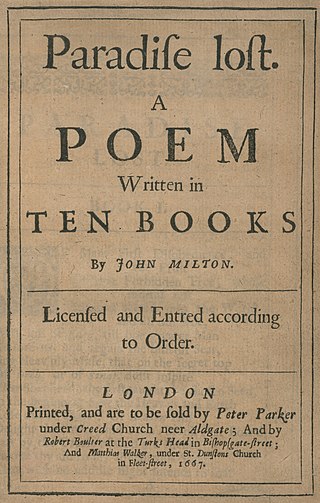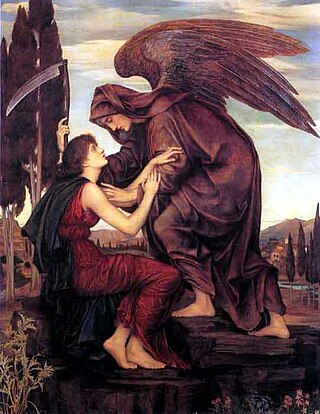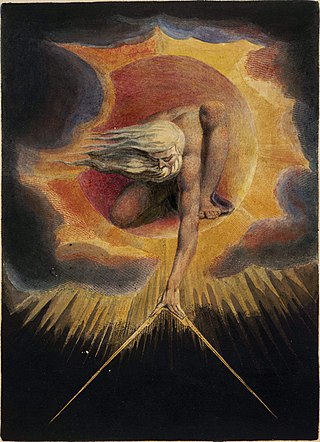Related Research Articles

Paradise Lost is an epic poem in blank verse by the 17th-century English poet John Milton (1608–1674). The first version, published in 1667, consists of ten books with over ten thousand lines of verse. A second edition followed in 1674, arranged into twelve books with minor revisions throughout. It is considered to be Milton's masterpiece, and it helped solidify his reputation as one of the greatest English poets of all time. The poem concerns the biblical story of the fall of man: the temptation of Adam and Eve by the fallen angel Satan and their expulsion from the Garden of Eden.

Enoch is a biblical figure and patriarch prior to Noah's flood, and the son of Jared and father of Methuselah. He was of the Antediluvian period in the Hebrew Bible.

The Book of Jubilees is an ancient Jewish apocryphal text of 50 chapters, considered canonical by the Ethiopian Orthodox Tewahedo Church, as well as by Beta Israel. Jubilees is considered one of the pseudepigrapha by the Eastern Orthodox, Catholic, and Protestant churches. Apart from the Beta Israel community, the book is not considered canonical within any of the denominations of Judaism.

Samael is an archangel in Talmudic and post-Talmudic lore; a figure who is the accuser or adversary, seducer, and destroying angel.

The Creation is an oratorio written in 1797 and 1798 by Joseph Haydn, and considered by many to be one of his masterpieces. The oratorio depicts and celebrates the creation of the world as narrated in the Book of Genesis.

Fallen angels are angels who were expelled from Heaven. The literal term "fallen angel" does not appear in any Abrahamic religious texts, but is used to describe angels cast out of heaven or angels who sinned. Such angels often tempt humans to sin.
The Conflict of Adam and Eve with Satan is a 6th-century Christian extracanonical work found in Ge'ez, translated from an Arabic original which is translated from Syriac source, namely Cave of Treasures.
The Life of Adam and Eve, also known in its Greek version as the Apocalypse of Moses, is a Jewish apocryphal group of writings. It recounts the lives of Adam and Eve from after their expulsion from the Garden of Eden to their deaths. It provides more detail about the Fall of Man, including Eve's version of the story. Satan explains that he rebelled when God commanded him to bow down to Adam. After Adam dies, he and all his descendants are promised a resurrection.

The Book of Moses, dictated by Joseph Smith, is part of the scriptural canon for some denominations in the Latter Day Saint movement. The book begins with the "Visions of Moses", a prologue to the story of the creation and the fall of man, and continues with material corresponding to the Joseph Smith Translation of the Bible's (JST) first six chapters of the Book of Genesis, interrupted by two chapters of "extracts from the prophecy of Enoch".

A Watcher is a type of biblical angel. The word occurs in both plural and singular forms in the Book of Daniel, where reference is made to the holiness of the beings. The apocryphal Books of Enoch refer to both good and bad Watchers, with a primary focus on the rebellious ones.
The Second Book of Enoch is a pseudepigraphic text in the apocalyptic genre. It describes the ascent of the patriarch Enoch, ancestor of Noah, through ten heavens of an Earth-centered cosmos. The Slavonic edition and translation of 2 Enoch is of Christian origin in the 8th century but is based on an earlier work. 2 Enoch is distinct from the Book of Enoch, known as 1 Enoch, and there is also an unrelated 3 Enoch, although none of the three books are considered canonical scripture by the majority of Jewish or Christian bodies. The numbering of these texts has been applied by scholars to distinguish each from the others.

Bascom Lamar Lunsford was a folklorist, performer of traditional Appalachian music, and lawyer from western North Carolina. He was often known by the nickname "Minstrel of the Appalachians."

Bereshit, Bereishit, Bereshis, Bereishis, or B'reshith is the first weekly Torah portion in the annual Jewish cycle of Torah reading. The parashah consists of Genesis 1:1–6:8.

Adam is the name given in Genesis 1–5 to the first human. Adam is the first human-being aware of God, and features as such in various belief systems.

Genesis B, also known as The Later Genesis, is a passage of Old English poetry describing the Fall of Satan and the Fall of Man, translated from an Old Saxon poem known as the Old Saxon Genesis. The passage known as Genesis B survives as an interpolation in a much longer Old English poem, the rest of which is known as Genesis A, which gives an otherwise fairly faithful translation of the biblical Book of Genesis. Genesis B comprises lines 235-851 of the whole poem.
The Church of Jesus Christ of Latter-day Saints teaches that Adam and Eve were the first man and the first woman to live on the earth and that their fall was an essential step in the plan of salvation. Adam in particular is a central figure in Mormon cosmology.

"John the Revelator" is a gospel blues call and response song. Music critic Thomas Ward describes it as "one of the most powerful songs in all of pre-war acoustic music ... [which] has been hugely influential to blues performers". American gospel-blues musician Blind Willie Johnson recorded "John the Revelator" in 1930. Subsequently, a variety of artists, including the Golden Gate Quartet, Son House, Depeche Mode, Jerry Garcia Band, The White Stripes, The Forest Rangers, The Sword, have recorded their renditions of the song, often with variations in the verses and music.
The Quran contains references to more than fifty people and events also found in the Bible. While the stories told in each book are generally comparable, there are also some notable differences.
Serpents are referred to in both the Hebrew Bible and the New Testament. The symbol of a serpent or snake played important roles in the religious traditions and cultural life of ancient Greece, Egypt, Mesopotamia, and Canaan. The serpent was a symbol of evil power and chaos from the underworld as well as a symbol of fertility, life, healing, and rebirth.
Seed of the woman or offspring of the woman is a phrase from the Book of Genesis: as a result of the serpent's temptation of Eve, which resulted in the fall of man, God announces that he will put an enmity between the seed of the serpent and the seed of the woman. In Christianity, this verse is known as the protoevangelium, and is interpreted as a prophecy of the coming of Jesus. In Judaism, the "seed of the woman" is taken as a collective reference to humankind in general.
References
- ↑ "Internet Archive". Retrieved June 19, 2008.
- ↑ Judy Cook's homepage Archived 2008-07-05 at the Wayback Machine . Retrieved June 19, 2008.